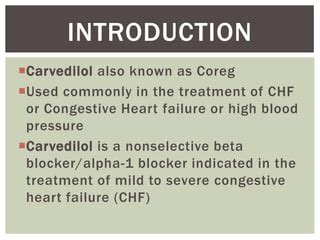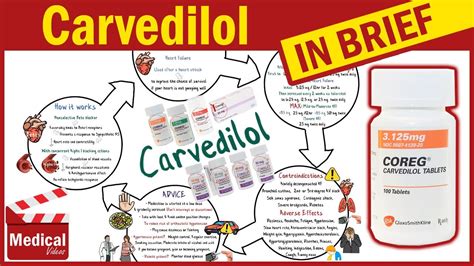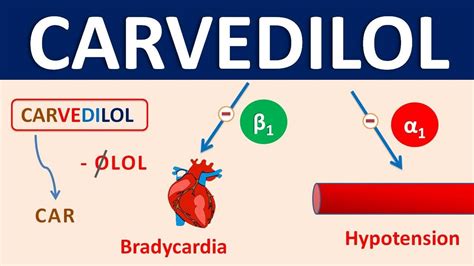Intro
Discover 5 uses of Carvedilol, a beta-blocker, for managing hypertension, heart failure, and angina, while exploring its benefits in reducing blood pressure, improving cardiovascular health, and preventing cardiac events.
The importance of managing cardiovascular health cannot be overstated, given the significant impact it has on overall wellbeing and quality of life. One medication that has been widely used to address various cardiovascular conditions is Carvedilol. This beta-blocker has been a cornerstone in the treatment of heart failure, high blood pressure, and certain types of angina, among other conditions. Its versatility and efficacy make it a valuable asset in the arsenal against cardiovascular disease. As we delve into the uses of Carvedilol, it becomes clear why it remains a preferred choice among healthcare providers.
The mechanism of action of Carvedilol, which involves blocking the effects of the hormone epinephrine, also known as adrenaline, and slowing the heart rate, underscores its potential in managing conditions where the heart's workload needs to be reduced. This not only helps in improving the heart's efficiency but also in reducing the risk of complications associated with high blood pressure and heart failure. Furthermore, its antioxidant properties add another layer of protection against cell damage, which can be beneficial in the long term.
The role of Carvedilol in modern medicine is multifaceted, reflecting its broad spectrum of activity. From improving survival rates in patients with heart failure to reducing the severity of symptoms in those with angina, its benefits are well-documented. Additionally, its use in managing high blood pressure highlights its versatility, as controlling blood pressure is crucial for preventing a wide range of cardiovascular events. As research continues to uncover the full potential of Carvedilol, its importance in the management of cardiovascular health is likely to grow.
Introduction to Carvedilol

Carvedilol is a non-selective beta-blocker with alpha-1 blocking activity, which distinguishes it from other beta-blockers. This dual action contributes to its effectiveness in reducing blood pressure and improving cardiac output. Its pharmacological profile makes it particularly useful in the management of heart failure, where its ability to decrease peripheral resistance and improve cardiac function can significantly enhance the quality of life for patients.
Uses of Carvedilol

The primary uses of Carvedilol include:
- Heart Failure: Carvedilol has been shown to reduce morbidity and mortality in patients with heart failure. It helps in improving the heart's pumping efficiency and reducing the risk of hospitalization due to worsening heart failure.
- High Blood Pressure: By reducing the heart rate and the force of the heart's contraction, Carvedilol lowers blood pressure, which can help prevent heart attacks, strokes, and kidney problems.
- Angina: Carvedilol can reduce the frequency of angina attacks and improve exercise tolerance by decreasing the heart's demand for oxygen.
- Post-Myocardial Infarction: In patients who have had a heart attack, Carvedilol can help reduce the risk of another heart attack and improve survival.
- Hypertension with Left Ventricular Hypertrophy: It is also used to treat high blood pressure in patients with an enlarged heart, reducing the risk of cardiovascular events.
Benefits of Carvedilol
The benefits of Carvedilol are multifaceted, reflecting its comprehensive mechanism of action. Some of the key advantages include: - Improved survival rates in heart failure patients - Reduction in blood pressure - Decreased frequency of angina attacks - Enhanced exercise tolerance - Protection against further cardiac damage after a heart attackWorking Mechanism of Carvedilol

Carvedilol works by blocking the action of certain natural chemicals in your body, such as epinephrine, on the heart and blood vessels. This effect reduces the heart rate, blood pressure, and strain on the heart. The alpha-1 blocking activity of Carvedilol also causes blood vessels to relax and widen, further reducing blood pressure and improving blood flow.
Steps for Taking Carvedilol
To ensure the effectiveness of Carvedilol and minimize side effects, it's crucial to follow these steps: 1. **Take as Directed:** Always take Carvedilol exactly as prescribed by your doctor. Do not change your dose or stop taking it without talking to your doctor first. 2. **With Food:** It's best to take Carvedilol with food to minimize the risk of stomach upset. 3. **Monitor Blood Pressure and Heart Rate:** Regular monitoring of blood pressure and heart rate can help adjust the dose of Carvedilol for optimal effect. 4. **Lifestyle Modifications:** Combining Carvedilol with lifestyle changes such as a healthy diet, regular exercise, and smoking cessation can enhance its benefits.Practical Examples and Statistical Data

Studies have consistently shown that Carvedilol can significantly reduce the risk of death from any cause in patients with heart failure. For instance, the CAPRICORN trial demonstrated that Carvedilol reduced the risk of all-cause mortality by 23% in patients with left ventricular dysfunction after a myocardial infarction. Such data underscores the critical role of Carvedilol in the management of cardiovascular diseases.
Common Side Effects of Carvedilol
While generally well-tolerated, Carvedilol can cause side effects, including: - Dizziness or lightheadedness - Fatigue - Headache - Nausea - DiarrheaIt's essential to discuss any side effects with your healthcare provider, as they may necessitate a dose adjustment or other interventions.
FAQs on Carvedilol

What is Carvedilol used for?
+Carvedilol is used to treat high blood pressure, heart failure, and certain types of angina. It works by relaxing blood vessels and reducing the heart's workload.
How long does it take for Carvedilol to start working?
+The effects of Carvedilol can be noticed within a few weeks of starting the medication, but it may take several months to achieve its full benefits.
Can I stop taking Carvedilol suddenly?
+No, it's not recommended to stop taking Carvedilol suddenly, as this can lead to a worsening of your condition. Always consult your doctor before making any changes to your medication regimen.
Conclusion and Future Directions

As we continue to navigate the complexities of cardiovascular health, medications like Carvedilol play a vital role in improving outcomes and quality of life for patients. With its broad range of applications and proven efficacy, Carvedilol remains a cornerstone in the treatment of heart failure, high blood pressure, and angina. As research progresses, it's likely that we will uncover even more benefits of this versatile medication, further solidifying its place in the management of cardiovascular diseases.
In conclusion, the importance of Carvedilol in modern medicine cannot be overstated. Its ability to address a wide range of cardiovascular conditions, coupled with its safety profile, makes it an indispensable tool for healthcare providers. As we move forward, it's essential to continue exploring the full potential of Carvedilol, ensuring that patients receive the best possible care for their cardiovascular health.
We invite you to share your thoughts and experiences with Carvedilol, and to explore the resources available for managing cardiovascular health. Your engagement and feedback are invaluable in helping us better understand the needs of our readers and in creating content that is informative, engaging, and relevant. Together, we can work towards a future where cardiovascular diseases are better managed, and the quality of life for those affected is significantly improved.
